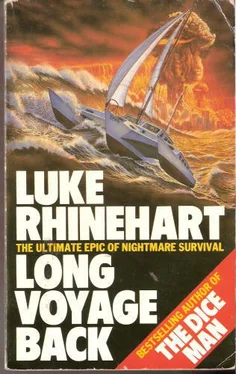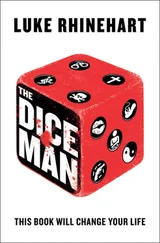Luke Rhinehart - Long Voyage Back
Здесь есть возможность читать онлайн «Luke Rhinehart - Long Voyage Back» весь текст электронной книги совершенно бесплатно (целиком полную версию без сокращений). В некоторых случаях можно слушать аудио, скачать через торрент в формате fb2 и присутствует краткое содержание. Город: New York, Год выпуска: 1983, ISBN: 1983, Издательство: Delacorte Press, Жанр: sf_postapocalyptic, на английском языке. Описание произведения, (предисловие) а так же отзывы посетителей доступны на портале библиотеки ЛибКат.
- Название:Long Voyage Back
- Автор:
- Издательство:Delacorte Press
- Жанр:
- Год:1983
- Город:New York
- ISBN:0-440-04617-3
- Рейтинг книги:4 / 5. Голосов: 1
-
Избранное:Добавить в избранное
- Отзывы:
-
Ваша оценка:
- 80
- 1
- 2
- 3
- 4
- 5
Long Voyage Back: краткое содержание, описание и аннотация
Предлагаем к чтению аннотацию, описание, краткое содержание или предисловие (зависит от того, что написал сам автор книги «Long Voyage Back»). Если вы не нашли необходимую информацию о книге — напишите в комментариях, мы постараемся отыскать её.
Long Voyage Back — читать онлайн бесплатно полную книгу (весь текст) целиком
Ниже представлен текст книги, разбитый по страницам. Система сохранения места последней прочитанной страницы, позволяет с удобством читать онлайн бесплатно книгу «Long Voyage Back», без необходимости каждый раз заново искать на чём Вы остановились. Поставьте закладку, и сможете в любой момент перейти на страницу, на которой закончили чтение.
Интервал:
Закладка:
“Have you finished your packing?” she asked.
“I did it last night,” Lisa replied. “But don’t forget to pack the lotions and towels you promised.”
“I will, I will. But look, honey. I need your help here. We’ll be eating as soon as your father gets home, and I’d like you to go downstairs and start heating up the leftover stew. I’ll be down soon.”
“Oh, Mother,” Lisa replied. “Can’t you do that?”
“Go!” said Jeanne.
And she went, with a promptness that never ceased to amaze Jeanne—was that Bob’s doing?—and in another moment she was alone again with her two suitcases and her sleeping bags.
Living with Bob wasn’t working anymore, and she knew why: the war thing had gotten too big, and was too important to both of them. The whole world was divided into two groups, those desperately trying to avoid a war and those desperately trying to make sure that their side won it. She and Bob were on opposite sides, and the tension between them was becoming too strong.
The tension often tempted her just to give up. The cause she was working for seemed so hopeless. For close to three years she’d been active in a Washington-based group called SMN, Stop the Madness Now, an eclectic collection of feminists, political radicals, pacifists, scientists, doctors, and even a few former high-ranking military officers, all of whom agreed on only one issue: the necessity of taking drastic action to reverse the momentum toward nuclear war. She’d begun as a volunteer, in effect an unpaid secretary, but a year ago had been put on part-time staff as fund-raiser and occasional speech writer and editor for one of the retired admirals.
But her promotion had, over the last six months, only made her increasingly depressed. The admiral spoke to the same audiences; the fund-raising events raised the same piddling amounts of money—their yearly total budget would barely finance the cost of a single jet fighter; the letters got published in The Washington Post and The New York Times and sank out of sight like pebbles in the sea; the marches got marched—and forgotten; and the great masses of Americans, vaguely worried about war, remained quite precisely and seriously worried about how they were going to meet their mortgage payments or feed their children. The prolonged worldwide economic crisis, which was so critically exacerbating global political tensions, also made the tasks of reducing nuclear armaments and creating a United Nations superforce very low priorities on most people’s agendas. The United States and the Soviet Union argued and maneuvered for power; she and Bob argued and maneuvered for… for what she didn’t know, and all four sides became increasingly alienated from one another.
Bob came home at six, gave a big hug to Skippy, a dignified kiss to Lisa, several words and caresses to their terrier, Banjo, and a cheerful “Hi, honey” to her. He went straight upstairs to change his clothes and pack an overnight bag. Ten minutes later they all had dinner together.
Jeanne’s scruffy jeans, open-necked cotton blouse, and her long dark hair falling wildly about her face and shoulders contrasted sharply with her husband’s neat three-piece suit, neatly combed dark hair, and chiseled good looks, but she sensed that their moods were aligned: they were both subdued and anxious, hoping to control their conflict. They sat at opposite ends of the table with Lisa on Jeanne’s left and Skip, propped up on two pillows, on her right. Lisa looked to Jeanne that evening, with her erect posture and precise, adult-sounding speech patterns, like a young governess in some Victorian melodrama. Her husband was the villain. And she…?
She certainly no longer felt like a heroine. Now that her sporadic idealistic efforts to promote disarmament and peace had proved to be so clearly ineffective, she felt as weak and foolish as Bob had always accused her of being. Yet as she watched him eating his dinner so meticulously and talking with such total seriousness with Lisa about the clothing she planned to take with her, she could feel herself getting angry. It was her anxiety being transmuted into anger, anger at those who were causing her to be afraid: the Russians and the Pentagon and people like Bob, who could so coolly calculate and contemplate the probabilities of various world catastrophes.
“And what are you going to be doing, daddy?” Jeanne heard Lisa say, and saw Bob start in surprise that the forbidden subject had been broached.
“Just playing with Mars,” he replied with a soft smile. He poured himself more wine and awkwardly signaled with the bottle to ask her if she wanted some more. She shook her head.
“Is that all you ever do?” Lisa asked, a little impatiently.
“I suppose so,” he replied. “But the situation these days has been changing so fast we have to feed our monster fresh food five times a day instead of once or twice a week.” She noticed his eyes flash as he said this.
“It still sounds boring,” said Lisa.
“Calculating the probability of various war scenarios is many things, some of which your mother has strong feelings about,” Bob replied, “but one thing it never is, is boring.”
“You’re enjoying this crisis, aren’t you?” Jeanne said quietly as she leaned forward to wipe some spilled gravy from Skip’s shirt. “I suppose for you it’s like playing in the Superbowl.”
Bob put down his fork and took a sip of wine.
“People are rather interested in our calculations these days,” he said, smiling nervously. “I’m human enough to enjoy using my capabilities to the fullest and knowing I’m needed.”
“That’s fine,” Jeanne said slowly. “But are you also human enough to be scared?”
He looked startled, then laughed.
“As a matter of fact, yes,” he replied. “The world is in a critically dangerous situation. I’m rather proud that our department, probably more than any other, is responsible for determining just how dangerous.”
“Why proud?” she asked quietly. Whenever they began to argue, their voices would get softer and softer, a trait that she realized she had adopted from him. Their civility went with the French Provincial furniture, but she had once told him that if he ever really got mad at her, his voice would get so low no one could hear it.
“Because we’re the ones who can warn the President which of his policy decisions are most dangerous,” Bob answered. “Without us he might do something that would provoke the Soviets into attacking us.”
Jeanne took a last spoonful of stew and wiped her mouth.
“And does your computer tell you what happens if they do attack?” she asked next.
“No, Jupiter does,” Bob replied, absently pushing Skippy’s hand away from the plate of chocolate chip cookies. “Jupiter calculates who will probably win once a war starts. We on Mars just calculate the chances of a war’s starting.”
“And what are the chances?” she asked with a coolness she didn’t feel. “Pretty high, aren’t they?”
He looked at her somberly and shook his head.
“You know better than that,” he replied. “Obviously no one really knows, not even Mars, and if it did, I wouldn’t tell you.”
“Thanks,” she said.
“But if I thought I knew, I’d bundle you and the kids off to the South Pacific. I certainly wouldn’t be chatting with you ten miles from the White House with a glass of wine in my hand.”
“Instead you send me off to the Chesapeake,” she countered, feeling even as she spoke that it was a childish remark.
“I do want you to go, Jeanne,” he said to her with unusual seriousness.
“Why?” she answered, frowning. “You know I’m not fond of being on the water, and it’s no safer there than anyplace else.”
Читать дальшеИнтервал:
Закладка:
Похожие книги на «Long Voyage Back»
Представляем Вашему вниманию похожие книги на «Long Voyage Back» списком для выбора. Мы отобрали схожую по названию и смыслу литературу в надежде предоставить читателям больше вариантов отыскать новые, интересные, ещё непрочитанные произведения.
Обсуждение, отзывы о книге «Long Voyage Back» и просто собственные мнения читателей. Оставьте ваши комментарии, напишите, что Вы думаете о произведении, его смысле или главных героях. Укажите что конкретно понравилось, а что нет, и почему Вы так считаете.












